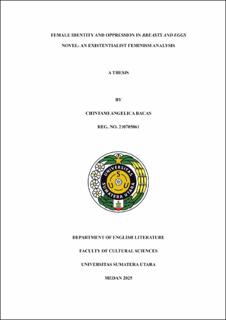Female Identity and Oppression in Breasts and Eggs Novel: An Existentialist Feminism Analysis
Identitas dan Penindasan Perempuan dalam Novel Breasts and Eggs: Analisis Feminisme Eksistensialis

Date
2025Author
Bacas, Chintami Angelica
Advisor(s)
Perangin-angin, Alemina Br
Putri, Dian Marisha
Metadata
Show full item recordAbstract
The struggle for women to define themselves outside patriarchal norms continues to be a central issue in both real life and literature. This research examines the novel Breasts and Eggs by Mieko Kawakami through Simone de Beauvoir’s existentialist feminism to explore the portrayal of female identity and oppression while also using Janet Burroway’s characterization theory to analyze how the characters are depicted through indirect characterization. The research focuses on three main characters: Natsuko, Makiko, and Midoriko. The researcher analyzes their characteristics, the social pressures they experience, and how they respond to patriarchal norms. A descriptive qualitative method and content analysis were used, with Beauvoir’s concepts of the Other, immanence, and transcendence as the theoretical framework. Data were drawn from selected phrases, sentences, and dialogue that reflect existential feminist ideas. The findings show that Natsuko struggles with social expectations regarding marriage and motherhood. Makiko, shaped by beauty standards, becomes overly concerned with physical appearance. Midoriko begins to question the biological roles imposed on women. The three characters respond differently to these pressures. Natsuko reaches transcendence through conscious life choices. Makiko remains in immanence by conforming to external expectations. Midoriko has not yet achieved transcendence because she has not yet manifested her resistance in real action.
Collections
- Undergraduate Theses [874]
